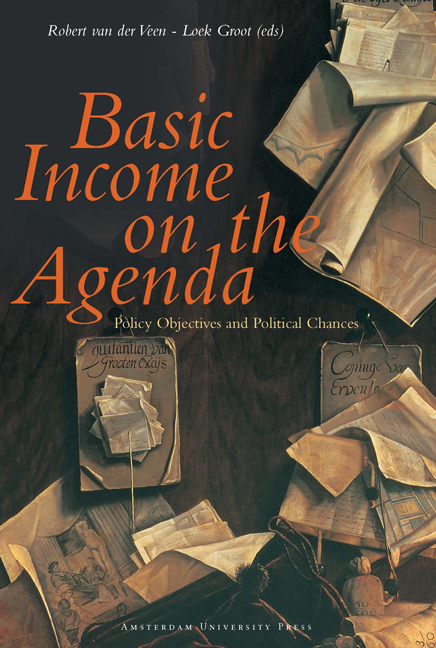The VIVANT Experiment in Belgium
Published online by Cambridge University Press: 23 January 2021
Summary
In the days following the multiple elections of June 13, 1999, Belgian newspapers were unanimous: VIVANT, a two-year-old party entirely unknown until a few months earlier, had achieved more than an honourable result by attracting about 130,000 votes (i.e. about 2 percent) at each of the elections that took place that day. The remarkable fact was that the party platform practically reduced to a single proposal: the introduction of an unconditional basic income. Founded in 1997 by high-tech businessman and member of BIEN Roland Duchâtelet, VIVANT had taken part in elections at any level for the first time.With no public funding or elected representative, the party had made its name by a large-scale campaign, essentially financed with Duchâtelet's personal means. He would later confess that his contribution to the campaign had reached the impressive amount of € 2,500,000.Through huge posters, advertisements in the press and massive doses of leaflets, VIVANT had been successful in attracting attention on its central proposal. ‘You will receive an income at the age of 18’, ‘Mum, VIVANT will give you an income’, ‘Free yourselves with the basic income’, ‘Choose your liberty with basic income’: with VIVANT, basic income was making a conspicuous and controversial entrance in Belgium's public debate.
Since the mid 1980s, the idea had mainly been supported by the two green parties, the Francophone ECOLO and the Flemish AGALEV. ECOLO adopted the idea of an unconditional and sufficient basic income as a medium-term objective at its first socio-economic congress in 1985, but it has always been a ‘theoretical horizon’ rather than a policy proposal. In the party's last economic programme, basic income is symptomatically presented as ‘one of the points of reference as regards the politics of income redistribution’. As far as AGALEV is concerned, basic income has tended to be more visibly promoted as a short-term reform. According to its most recent programme, ‘the basis of the new green social security will consist in a guaranteed basic income for everyone’. The related idea of a Negative Income Tax (NIT) was somewhat more popular in other political circles.
- Type
- Chapter
- Information
- Basic Income on the AgendaPolicy Objectives and Political Chances, pp. 276 - 284Publisher: Amsterdam University PressPrint publication year: 2000
- 3
- Cited by



